What do successful people all have in common? Money? Fame? Fantastic lifestyles? Maybe! But one thing that really sets them apart from everybody else is failure. That’s right! Successful people embrace failure as a way to succeed.
It might seem counter-intuitive to think failure can aid in the path to success, but when you hear the reasons why successful people find failure to be helpful, you might start to rethink how you view failure in general.
Former CEO of IBM, Tom Watson stated,
“If you want to succeed, double your failure rate.”
Redefining Failure
The dictionary has several definitions of failure. But generally, the word can be summed up as an “inability to meet an expectation.” In whatever you’re doing, you have expectations for how it will go. When it doesn’t turn out the way we’d hoped then we see it as having completely failed. That’s a pretty strong determination for one action.
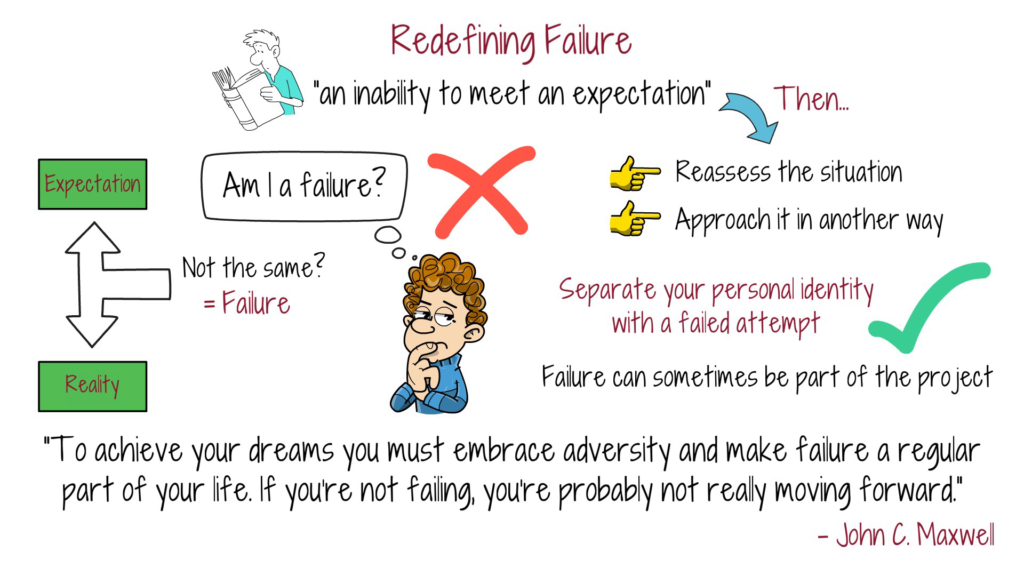
Author John C. Maxwell stated,
“To achieve your dreams you must embrace adversity and make failure a regular part of your life. If you’re not failing, you’re probably not really moving forward.”
If you see something that didn’t work out as being “the end of the road”, rather than a stepping stone, then you might think of failure as an end in itself. You might even think of YOURSELF as a failure. But successful people know to separate their personal identity with a failed attempt at something. By recognizing that failure can sometimes be part of the project, they can continue to move forward without taking a hit to their self-esteem.
Redefining failure as just an inability to meet an expectation might make it easier to reassess the situation and approach it in another way. Think of how you could redefine failure to bring a positive spin to an otherwise disappointing situation.
Failure is Inevitable
Have you ever met someone who has gone through life without a single failure or setback? Probably not. Physicist Albert Einstein said,
“Anyone who has never made a mistake has never tried anything new.”
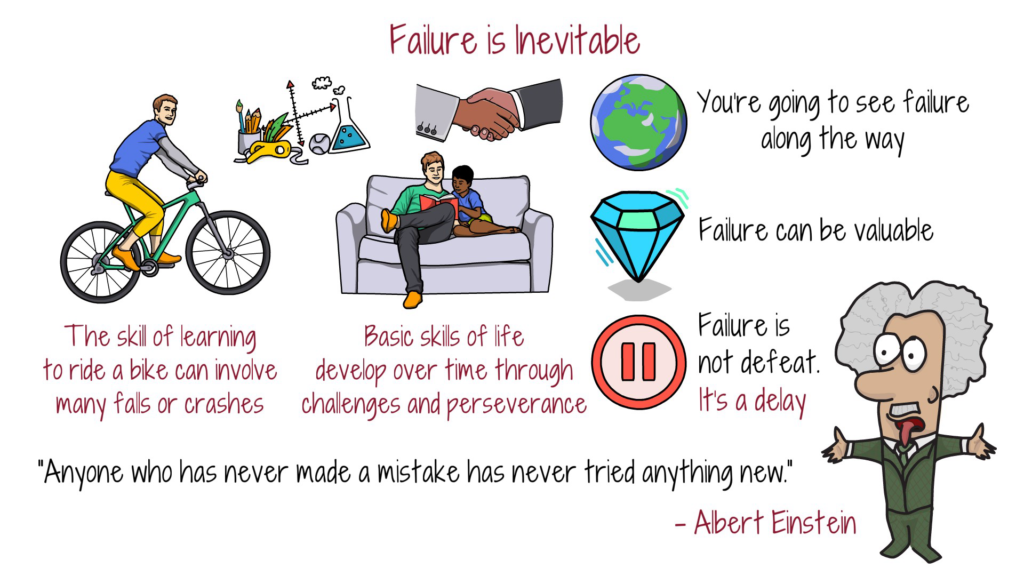
Think about the first time you tried to ride a bicycle. You probably fell or crashed many times before you mastered the skill and balance to ride. If you gave up, you probably still can’t ride a bike. Or what about learning to read? The basic skills of life, and continued learning, develop over time through challenges and perseverance.
Other attempts in life follow a similar line. Whether you’re developing new skills, starting a business, or changing the world, you’re going to see failure along the way. It’s inevitable, but it’s not terrible.
Successful people know that failure is not only inevitable, but it can be valuable. They expect it, so they’re not thrown off balance when it happens. They view it as part of the process, and proceed toward their goals. Failure, in those terms, is not defeat. It’s a delay. Or maybe a near miss or oversight. But it’s not going to stop the show.
Opportunities and Motivation
When successful people encounter failure, they see it as an opportunity. It’s a chance to identify a weakness and develop strategies to become better. It’s a way to make whatever you’re doing stronger and more effective than you had originally imagined. When something doesn’t meet our expectations, we might become motivated to ask why it failed, and improve our methods.
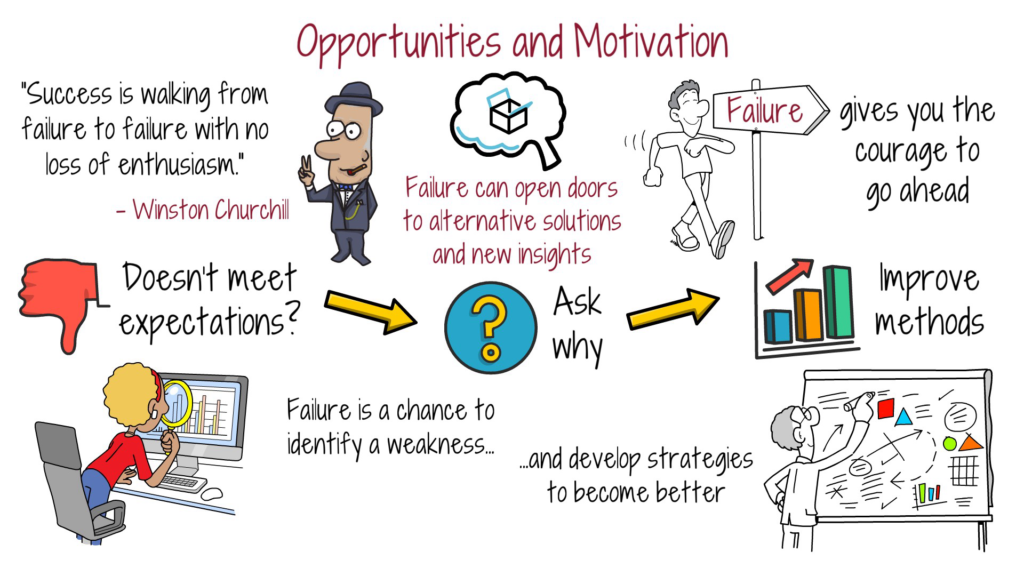
Failure unleashes potential. Once you’ve failed at something, there’s nothing to lose. It gives you the courage to go ahead because you’re no longer afraid to fail. You already did! And you’re still standing. Becoming motivated to work harder and smarter to succeed is a benefit of failure.
Winston Churchill said,
“Success is walking from failure to failure with no loss of enthusiasm.”
Failure can open your mind, and give you new ways of thinking. When you think of failure as a tool, you may be able to use it to your advantage. It could open doors to alternative solutions. Or expand your project in other ways that you had not anticipated.
Even if a failed attempt means starting over, it can still bring new insights into how you can do things differently.
Lessons Learned
Successful people know that failure always teaches you something. They view failure as a valuable learning experience, rather than something to be feared or avoided. Failure can provide important insights for growth and improvement. In fact, sometimes the lessons learned along the way can be more important than the finished product.
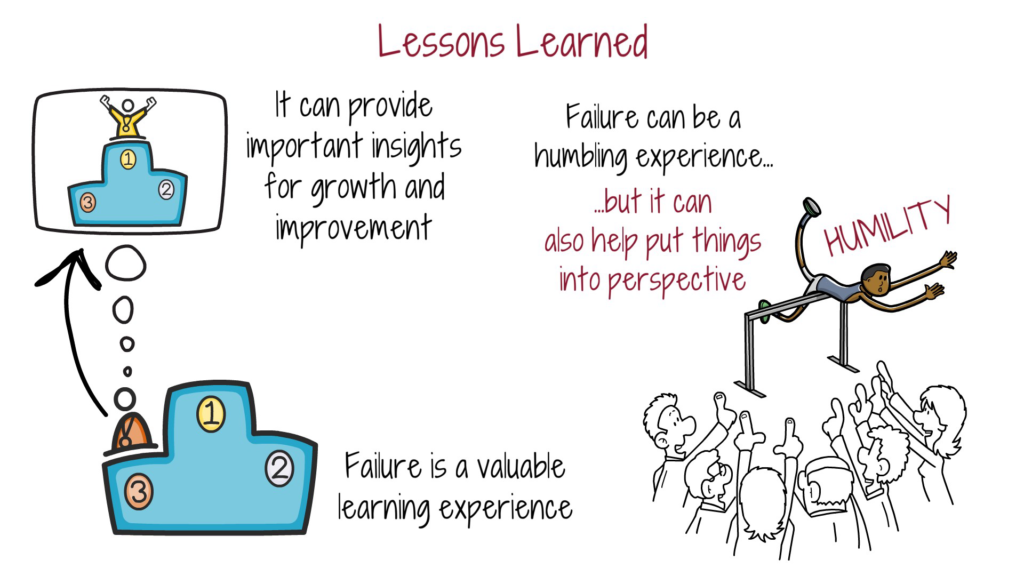
For example, one thing some people learn through failure is humility. When something doesn’t turn out the way you had hoped, it can be a humbling experience. Especially if people were watching to see if you would succeed. But even if you are the only one who sees that you failed, it can still create a sense of discouragement, and strike a blow to your self confidence. It may seem harsh at the time, but it could also help put it into perspective. Facing the reality of your failure could make you a more humble and compassionate person.
Another benefit of failure is teaching resilience. When you fail at something, but don’t take it personally, you learn to take things in stride. Successful people know that bouncing back from difficult situations like failing at something, can make you stronger. Every time you overcome an obstacle, you gain insight and experience. And from that you might find confidence in the long run.
After having endured failure, continuing to move forward can help build character. Life can be messy. Developing the mental toughness needed to overcome challenges can be an asset.
Entrepreneur Malcolm Forbes said,
“Failure is success if we learn from it.”
If we can learn from our mistakes, we may become better at taking risks, and trying new things. The term, “Intelligent Failures”, coined by Professor Sim Sitkin at Duke University, suggests that when we learn from failure, growth and progress is the result.
Successful people embrace failure to help them move through the rough spots more efficiently.
- Identifying mistakes as soon as possible and acknowledging them to others in their team, can save time. Avoiding telling anyone about it might prove to be costly.
- Staying positive eliminates blame. There’s nothing that slows you down more than being distracted by arguments and pointing fingers. Successful people don’t waste time on drama.
- Making changes to improve the situation, and taking precautions not to repeat the same mistakes can help things move forward more quickly.
Successful people know that failure is inevitable, but when they detect mistakes, analyze and learn from it, and don’t quit, they can move on and continue to work toward the goal. More mistakes will inevitably appear, but each time they cross one hurdle, they learn more about doing better next time.
The Secrets They Know
The things that successful people learn from failure is what helps them to achieve even more. It may seem like a secret formula, but it’s really not that mysterious.
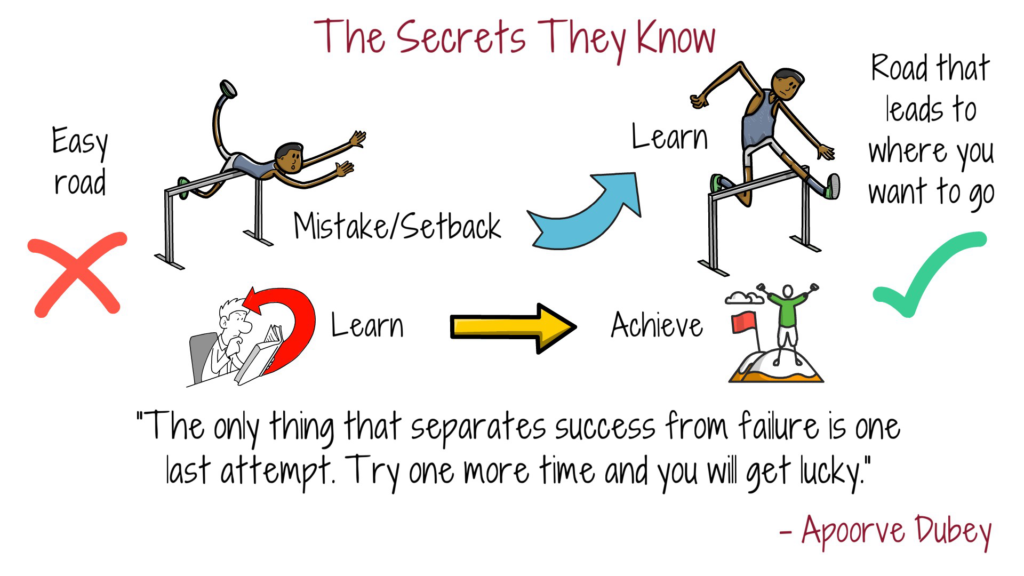
CEO and Author, Apoorve Dubey stated,
“The only thing that separates success from failure is one last attempt. Try one more time and you will get lucky.”
Failure is a stepping stone, not a permanent defeat. Successful people know that when mistakes and setbacks happen, it’s just another opportunity to learn from. Perseverance, regardless of the obstacles they encounter, leads successful people to the goal of their choosing. They aren’t looking for an easy road. They’re looking for the road that leads them to where they want to go. And failure doesn’t stand in their way.
Ryan Holiday reminds us in his book, The Obstacle Is the Way, that often-times the thing that stands in our way teaches us valuable lessons that can lead us to success.
Final Thoughts
If you think you can do things perfectly and never fail, you may be in for a rude awakening. In fact, if you’re doing things perfectly, without fail, you may actually be missing something!
Prime Minister W.E. Gladstone once said,
“No man ever became great or good except through many and great mistakes.”
So the next time you fail to meet an expectation and are tempted to throw in the towel, you might reconsider your next move! You may just find that the best approach could be to think like a successful person and embrace failure.
